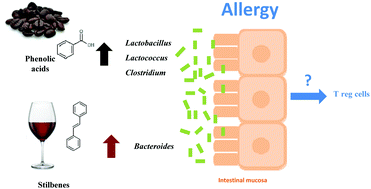Phenolic compounds from red wine and coffee are associated with specific intestinal microorganisms in allergic subjects
Abstract
The dietary modulation of gut microbiota, suggested to be involved in allergy processes, has recently attracted much interest. While several studies have addressed the use of fibres to modify intestinal microbial populations, information about other components, such as phenolic compounds, is scarce. The aim of this work was to identify the dietary components able to influence the microbiota in 23 subjects suffering from rhinitis and allergic asthma, and 22 age- and sex-matched controls. The food intake was recorded by means of an annual food frequency questionnaire. Dietary fibre tables were obtained from Marlett et al., and the Phenol-Explorer database was used to assess the phenolic compound intake. The quantification of microbial groups was performed using an Ion Torrent 16S rRNA gene-based analysis. The results showed a direct association between the intake of red wine, a source of stilbenes, and the relative abundance of Bacteroides, and between the intake of coffee, rich in phenolic acids, and the abundance of Clostridium, Lactococcus and Lactobacillus genera. Despite epidemiological analyses not establishing causality, these results support the association between polyphenol-rich beverages and faecal microbiota in allergic patients.


 Please wait while we load your content...
Please wait while we load your content...